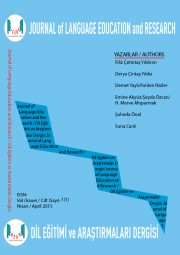Subjectivity in Complex Sentences: The Effects of Converbs to Causal Relations
Subjectivity in Complex Sentences: The Effects of Converbs to Causal Relations
Author(s): Filiz Çetintaş-YıldırımSubject(s): Syntax, Turkic languages
Published by: T.C. MEHMET AKİF ERSOY ÜNİVERSİTESİ EĞİTİM FAKÜLTESİ
Keywords: converb; causal relation; subjectivity; complex sentence;
Summary/Abstract: A causal relation is considered as the most important element which provides coherence in both written and oral texts. In complex sentences which are constructed by the use of particular converbs may there be a closer subjective relation –to what extent the speaker/writer involves himself/herself to the causal relation- than other converbs which also have causal implications. In this study, three Turkish converbs, –IncA, - DIĞI için and –DIĞINA göre, which can convey volitional causal relations are taken into consideration in terms of the subjectivity levels observed in the complex sentences. Nearly 600 complex sentences –obtained from WebCorp- are analyzed with regards to the propositional content of the main clause, the type of causal relationship, the type of conceptualizer and the linguistic realization of the conceptualizer. Frequency distributions of these converbs highlight that the converbs can be scaled according to the subjectivity level of the complex sentences that they are used in.
Journal: Dil Eğitimi ve Araştırmaları Dergisi
- Issue Year: 1/2015
- Issue No: 1
- Page Range: 1-13
- Page Count: 13
- Language: English

